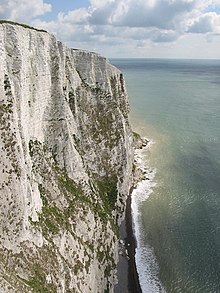|
Saxon Shore Way
  The Saxon Shore Way is a long-distance footpath in England. It starts at Gravesend, Kent, and traces the coast of South-East England as it was in Roman times as far as Hastings, East Sussex, 163 miles (262 km) in total.[1] This means that around Romney Marsh the route runs significantly inland from the modern coastline. HistoryThe line of the Roman fortification that the route traces includes ancient forts, modern towns, nature reserves and coastline: four Roman forts built in the fourth century lie along the route, at Reculver, Richborough, Dover and Lympne. At Seasalter there is an internationally important area for geese, ducks, and waders. The diversity of scenery along the route includes the wide expanses of marshland bordering the Thames and Medway estuaries, the White cliffs of Dover, and panoramic views over Romney Marsh from the escarpment that marks the ancient coastline between Folkestone and Rye. The Saxon Shore Way was originally opened in 1980, but has since been re-established, and in parts re-routed and extended.[2] It follows the coastline of the South East as it was about 1500 years ago, long before the North Kent Marshes or the Romney Marsh came into existence, when the cliff lines to the north and south extended further into the sea and when the Wantsum Channel provided a thoroughfare for boats between the Isle of Thanet and mainland England.[2] The Way takes its name, the Saxon Shore, from a line of fortifications built along the coastline as it was in the 3rd century AD, towards the end of the Roman period. In this time of crisis Saxon invaders came from the southern regions of modern Denmark and in response the Romans built a line of defensive forts along the coast to repel the newcomers.[2] The routeGravesend to Faversham 
Faversham
Faversham to Deal
Deal to Dover
Dover to Rye
Rye
Rye to Hastings
See alsoReferences
Wikimedia Commons has media related to Saxon Shore Way. |
||||||||||||
Portal di Ensiklopedia Dunia